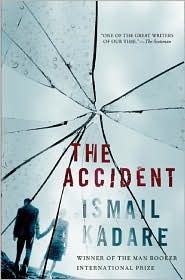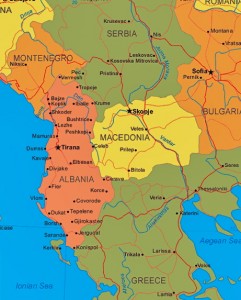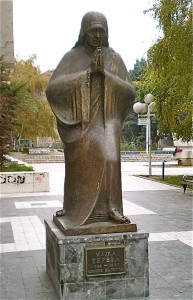Note: Ismail Kadare became the first WINNER of the Man Booker International Prize in 2005 for his complete body of work.
“Everywhere in the world events flow noisily on the surface, while their deep currents pull silently, but nowhere is this contrast so striking as in the Balkans. Gales sweep the mountains, lashing the tall firs and mighty oaks, and the whole peninsula appears demented.”
Shortl y after a taxi leaves the Miramax Hotel in Vienna for the airport, it veers off the autobahn, somersaults into a gully, and kills the man and woman passengers, both Albanian. The driver, seriously injured, is taken to the hospital in critical condition. A Dutch couple witnesses the accident, as does the driver of a Euromobil truck, and both give information to the Austrian police. The driver, when he is able to talk, tells investigators that when he looked into the rear view mirror, immediately before the accident, the couple were “trying to kiss,” a peculiar description. The dead man, Besfort Y., was an analyst for the Council of Europe on western Balkan affairs, and he had been a “thorn in the side of Yugoslavia” before its divisions–there is suspicion that he might have been responsible for the bombing of the country. Despite this, the accident is initially thought to be a routine traffic accident.
y after a taxi leaves the Miramax Hotel in Vienna for the airport, it veers off the autobahn, somersaults into a gully, and kills the man and woman passengers, both Albanian. The driver, seriously injured, is taken to the hospital in critical condition. A Dutch couple witnesses the accident, as does the driver of a Euromobil truck, and both give information to the Austrian police. The driver, when he is able to talk, tells investigators that when he looked into the rear view mirror, immediately before the accident, the couple were “trying to kiss,” a peculiar description. The dead man, Besfort Y., was an analyst for the Council of Europe on western Balkan affairs, and he had been a “thorn in the side of Yugoslavia” before its divisions–there is suspicion that he might have been responsible for the bombing of the country. Despite this, the accident is initially thought to be a routine traffic accident.
It is not till several months later that the European Road Safety Institute, upon receiving a copy of the accident report, regards this as an “unusual” accident. Three months after that, the State of Serbia and Montenegro, which had had both victims under surveillance, begins to look into the accident, and their interest, in turn, sparks the interest of the Albanian Secret Service, an eventuality which makes the narrator wonder if this is a political murder after the fall of communism, or an example of residual “communist paranoia.” Contacting members of the Albanian community abroad, the Albanian Secret Service retrieves letters, photos, airline tickets, hotel addresses, and even bills, which give a broader picture of the lives of the two victims.
At this point at the beginning of this new novel by Albanian author Ismail Kadare, the story appears to be fairly straightforward, perhaps a police procedural or the beginning of an espionage thriller, but despite the author’s almost bare-bones style, the novel quickly becomes full of confusing information and evidence. Nothing is as simple as it seems here, and even the characters, as their lives are investigated and explored, remain mysterious and almost impervious to analysis. We know only what they tell us about themselves and their relationship, not what the reader may be accustomed to concluding after seeing the characters in action and interaction.
The victims, who had previously been in Strasbourg, Rome, and Luxembourg, in addition to Vienna, have known each other for twelve years, and their relationship in recent months seems to have suffered a major setback. Rovena’s letters, in particular, show her to be sometimes cheerful, and sometimes despondent. Sometimes the letters indicate that she is a call girl and he a client. One of Besfort’s friends has indicated that Besfort believed he had “made a mistake” with a young woman, and Rovena’s friends believe that he is planning to murder her. At other times, however, their problems appear to be related to the political situation in the Balkans. Several mysterious phone calls received by Besfort have suggested that he has had a “quarrel with Israel,” but Rovena notes that “After Serbia was defeated, you did not seem to know what to do with yourself, and you turned on me again.” The Serbs have been trying to prove that Besfort has bamboozled the West, especially President Clinton, Gen. Wesley Clark, and Secretary of State Madeline Albright by becoming close to them.
When a mysterious researcher (perhaps the metafictional author) delves into the deepest archives of the case, he discovers the files on the two victims, and eventually believes he can solve the case by rearranging its “mosaics.” Concentrating on the last forty weeks of their relationship, he decides to reconstruct these weeks as “acts,” or “cantos, like an ancient epic.” At this point, the novel becomes enigmatic, to say the least, and what had seemed a fairly straightforward novel involving mysteries becomes, instead, a novel in which the author’s intentions and direction themselves remain a mystery. Besfort has dreams, which include the signing of papers on behalf of Josef Stalin, but he also has forays inside Stalin’s head, and what is dream and what is Besfort’s imagination merge. Parallels are drawn between the behavior of Besfort and the forty-year dictatorship of Enver Hoxha of Albania, who died in 1985. References to the conspiracies against Hoxha also abound, though their relevance to this story is obscure.
To further complicate matters, the author also refers several times to the occult and “traces of the unnatural” as the novel develops. A gypsy fortune teller advises Rovena. There are references to entering “the other zone” when the two lovers travel to Albania. Time itself swirls, confounding the chronology, which provides no dates, and erotic encounters add further complexity. Ultimately, the author’s intentions for the novel itself become as elusive as the truth about the accident. What appears to be a straightforward investigation of an accident ranges widely into other areas and confounds fact and fiction, history and other-worldly events. If Kadare is trying to create a “political allegory,” by drawing parallels between the action here and the history of Albania, as he has done in other novels, the nature of his parallels remain obscure, at least to me.
ALSO by Kadare: THE FALL OF THE STONE CITY and THE DOLL: A PORTRAIT OF MY MOTHER
Photos, in order: The photo of the author is from http://specials.rediff.com
The map of Albania and its bordering countries is from http://geology.com
The statue of Mother Teresa, an ethnic Albanian, is by Varga Attila and is found here: http://commons.wikimedia.org



